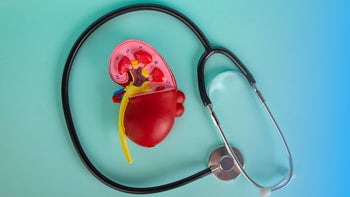
4 Medications That Can Cause High Creatinine Levels on a Blood Test
Key takeaways:
A high creatinine level in a blood test can be a sign of decreased kidney function or kidney disease. But there are other reasons this level can be high.
Some medications can increase the creatinine level without actually hurting the kidneys. This includes some antibiotics, antacids, and cholesterol medications.
If you take one of these medications and your creatinine level is above normal range, it’s still important to follow up with a medical professional to make sure your kidneys are healthy.
Table of contents

After a blood test, it’s easy to worry if any of the results are out of normal range. And one of the most common abnormal lab results is a high creatinine level.
First, it helps to understand what creatinine is in a blood test. Creatinine is a substance in the blood that’s removed by the kidneys. So it can be an indirect measure of kidney function. An elevated creatinine level in a blood test that’s out of the normal range could mean your kidneys aren’t functioning at their best. But this isn’t always the case.
What can cause high creatinine levels?
Many conditions and medications can cause problems for the kidneys and lead to high creatinine levels. Some examples include:
Diabetes
High blood pressure
Autoimmune conditions, like lupus
Polycystic kidney disease
Renal artery stenosis
Medications, like nonsteroidal anti-inflammatory drugs (NSAIDs) and diuretics
Search and compare options
But there are other causes of high creatinine levels that don’t suggest long-term kidney disease. These include:
Dehydration, which can temporarily increase creatinine levels
High protein intake
A large amount of muscle mass
Creatine, a common supplement for bodybuilders and other athletes
And there are a few medications that elevate creatinine levels without actually affecting kidney function.
Common medications that cause high creatinine levels without hurting the kidneys
1. Sulfamethoxazole/trimethoprim (Bactrim/Septra)
Sulfamethoxazole/trimethoprim (Bactrim) is an antibiotic that people take for urinary tract infections (UTIs), skin infections, and some upper respiratory infections. This medication causes the body to retain more creatinine than you normally would. And this may elevate your creatinine blood test even though your kidneys are working perfectly fine.
In one study of people who had a kidney transplant, taking trimethoprim caused false increases in the creatinine level even though the kidneys were otherwise working normally.
2. Cimetidine (Tagamet)
Cimetidine (Tagamet) is an acid blocker that people take for acid reflux and heartburn symptoms. It decreases the amount of creatinine the body clears but doesn’t harm the kidneys. Cimetidine is a common cause of a falsely elevated creatinine test, according to a 2012 review of related research.
Read more like this
Explore these related articles, suggested for readers like you.
Cimetidine can increase the level of creatinine by about 15% in people who have normal kidney function. Creatinine levels will usually return to normal when someone stops taking it.
Famotidine (Pepcid) and ranitidine (Zantac) — two related heartburn medications — don’t cause the same false elevations of serum creatinine.
3. IV cephalosporin antibiotics
Cephalosporin antibiotics treat skin infections, ear infections, UTIs, and respiratory tract infections. Some of them can interfere with the creatinine blood test.
Studies show that IV (intravenous) cefoxitin and cefazolin can falsely elevate creatinine levels. But the good news is that none of the commonly prescribed oral cephalosporins would falsely elevate creatinine. These include cephalexin (Keflex), cefuroxime (Ceftin), and cefaclor (Ceclor).
4. Fenofibrate (Tricor)
Fenofibrate (Tricor) lowers triglyceride levels and improves cholesterol. People take this when they have very high triglyceride levels or a high risk for heart disease. It causes the body to make more creatinine than normal. This can result in a creatinine level above normal range, but this has nothing to do with kidney function.
Less common medications that can elevate serum creatinine
There are many other medications that have been reported to cause high serum creatinine without any true harm to the kidneys. These include:
Pyrimethamine (a medication to treat parasites)
Aloxiprin (a salicylate drug used in some types of arthritis)
Phenacemide (an antiseizure medication)
High doses of prednisone (a steroid used in many different conditions)
If you’re taking a new medication and notice a change in your creatinine level, it makes sense to look into whether the medication might be the cause.
What is a normal creatinine range?
A normal creatinine range varies slightly between men and women. This is because of the variation in average muscle mass.
Normal creatinine for a man | 0.6 to 1.2 mg/dl |
Normal creatinine for a woman | 0.5 to 1.1 mg/dl |
When to worry about creatinine levels
Anytime you have a high creatinine level, it should be taken seriously. This doesn’t necessarily mean you have a long-term kidney disease or that you have any permanent kidney damage. But still, it’s more likely that a high creatinine level is due to a change in kidney function rather than a false alarm — even if that change is only temporary.
So if you have an elevated creatinine level, it’s important to talk with your primary care professional. They can help figure out if it’s a sign of kidney disease. They can also provide guidance on what you can do to lower your creatinine levels. And it may be as simple as staying hydrated or stopping a certain medication. So don’t worry — just be sure to get it checked out.
The bottom line
If your blood test shows a creatinine level above normal range, there are many possible explanations for this. And one of them could be your medications. Some medications can potentially harm your kidney function. But other medications can simply change the results of the blood test. Talk with a medical professional about additional testing to see whether your kidneys are functioning normally.
Why trust our experts?


References
Andreev, E., et al. (2001). A rise in plasma creatinine that is not a sign of renal failure: Which drugs can be responsible? Journal of International Medicine.
Berg, K. J., et al. (1989). Renal effects of trimethoprim in ciclosporin- and azathioprine-treated kidney-allografted patients. Nephron.
Burry, H. C., et al. (1976). Apparent reduction of endogenous creatinine clearance by salicylate treatment. British Medical Journal.
Dubb, J. W., et al. (1978). Effect of cimetidine on renal function in normal man. Clinical Pharmacology and Therapeutics.
Hosten, A. O. (1990). Chapter 193: BUN and creatinine. Clinical Methods: The History, Physical, and Laboratory Examinations. Butterworths.
Nanji, A. A., et al. (1987). Interference by cephalosporins with creatinine measurement by desk-top analyzers. European Journal of Clinical Pharmacology.
Samra, M., et al. (2012). False estimates of elevated creatinine. The Permanente Journal.
Van Acker, B. A., et al. (1993). Effect of prednisone on renal function in man. Nephron.





























